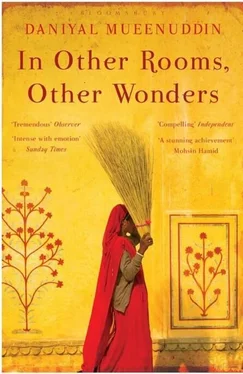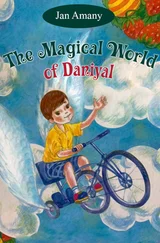Jaglani walked through the room he shared with her and into her own quarters. Unlike the rest of the house, which was dark and crowded with furniture, Zainab’s room had only a small low bed, padded with cotton, a chair, and a plain wooden table, on which she had arranged her makeup and combs, with a mirror in front of it, and in one corner a crib. A small cotton dhurrie covered the center of the brick floor. The high windows stood open, drawing light into the room, reflecting off the freshly whitewashed walls. The baby stood on the bed, waving her fat little arms, naked, her feet planted between Zainab’s crossed legs. Zainab leaned against a pillow and, dipping a cloth into a bowl of warm water, gently washed the baby. The light from the windows reflected off the disturbed water in the brass bowl, throwing a pattern onto the walls.
‘Watch,’ said Zainab. She tickled the baby, whom she had renamed Saba, under the chin, holding her around the waist. He noticed the strength of Zainab’s slender arm, on which the veins stood out, and he noticed the sureness with which his wife held this baby. The baby giggled. Zainab laid her on the bed and bent over her.
‘Say it,’ she whispered soothingly. Her pale manicured feet peeked out under her thighs, the soles reddened with henna. ‘Say it, little bunny, my little Saba.’
The baby looked up at her, smiling, coral gums wet with spittle. She waved her chubby arms, fingers splayed. ‘Ma,’ she said.
‘See?’ said Zainab, turning to Jaglani, who sat on the little chair next to the table. Zainab had been worrying because the baby, nearly two years old, had not yet begun to speak. Vulnerable, he watched the baby intently, smiling a shy smile, his features becoming gentle, the face of a sad boy, knowing and needy. ‘If only the managers could see this smile,’ she would say.
Zainab gestured. ‘Come, bring your chair over by us.’
He carried the chair across the room and sat down, his elbows on his knees, looking into the little girl’s face and at Zainab’s hair, which fell over the baby.
For several months Jaglani had been feeling unwell. A few days after this little scene with the baby, Jaglani learned that he had bone cancer, and that he would be dead within six months. When he didn’t visit the village for a week Zainab went to see her brother Mustafa, who spent each Friday night with his family in Dunyapur.
‘You’d better come inside,’ said Mustafa. He took her into a neat room, adorned with the fruits of his petty thefts, his inflated bills — a television and video player, a sewing machine covered with an embroidered cloth, a large garish clock with a plastic figure of a shepherdess that moved back and forth across the face — for like everyone else on the farm Mustafa trimmed out money where he could, a few rupees on the petrol, a bit of padding when he bought spare parts.
‘What?’ she said, as soon as her brother closed the door.
‘He’s dying.’
She sat down, almost falling, and hung her head. ‘Oh my God. Of what? And now what do I do?’
‘It’s cancer. You’d better be sharp.’
‘He hasn’t come in a week,’ she said.
‘Don’t count on anything anymore,’said Mustafa. ‘His family’s all around him now. He’ll get weak fast. Don’t forget, he owns twenty squares of land, just as a start. You’ll be lucky to see him again, at least to see him alone.’
‘He’s tied to me,’ she said, looking Mustafa in the eye. ‘He’ll come.’
Mustafa sat down and ran his hands over his face. ‘What a mess. He’s going tomorrow to Lahore. He’s trying to make sure that Shabir wins the by-election. That won’t happen, the boy barely has enough spine to stand upright. The big guys around here will eat him up once Jaglani’s gone. No one reaches out very far from the grave.’
‘You know what that means for me,’ she said. Brother and sister understood the enormity of her loss, the failure of her preparations against abandonment. ‘They’re going to take Saba away from me, aren’t they? She’s too young, in a year she won’t remember me. I’ll get nothing.’
Jaglani faded away. Knowing how vulnerable his family would be to the enemies he had made in the course of a life in politics, he went to Lahore, seeking a sure seat in the Assembly for his son, the one who gave a daughter to Zainab, in the by-election that would follow his death.
The provincial party chief, a ward boss from Lahore who held the office of Punjab Chief Minister, received Jaglani just after sunset at his house, a large shabby building constructed on public land, formerly a park, which he had condemned and appropriated as soon as he attained office, throwing a wall around it.
Jaglani waited in the anteroom with twenty or thirty other supplicants, mostly provincial politicians from the business classes, who gathered in circles or huddled together on grimy sofas, speaking in undertones and puffing cigarettes. Two pictures hung on a wall of the dirty, smoky room, one of the country’s founder, the Quaid-e-Azam, and next to it, just slightly lower, a photo of the party’s leader.
Entering the immaculate office, ushered in by a sleek-looking steno, Jaglani approached the Chief Minister, who sat behind a desk covered with green baize, reading a file. He looked up, narrowed his eyes, and rose.
‘Hello, hello, Chaudrey Sahib.’
He walked from behind the desk, his Western clothes, a pinstripe suit and gold cuff links and English shoes, distinguishing him from Jaglani and from most of the supplicants waiting in the anteroom. Taking Jaglani’s hand, and holding on to it, he sat them down next to each other on a sofa.
‘You’re looking well,’ said the Chief Minister insincerely.
‘Thanks to Your Honor.’
‘And how is Mr. K. K. Harouni?’
They began speaking of the political situation in Jaglani’s district. The Chief Minister spoke little but listened, his face set in a shrewd expression, looking at the opposite wall and occasionally asking questions.
After ten minutes he looked at his watch.
‘And how’s everything else?’
‘I’ve come with a request, sir. I regret to say I’ve been diagnosed with cancer.’
‘Well, well, I’m so sorry,’ said the Chief Minister, who knew all about it.
‘Sir, I request that the party support my son in the by-election.’
‘Nonsense, nonsense,’ said the minister. ‘You’re healthy as a horse. These doctors kill everyone off, everyone. You’ve still got twenty years ahead of you, bulling Dunyapur.’
‘If something does happen to me, however, will you support the boy? He’s capable, he knows the area, and he knows all the people. I’ve served the party for twenty-five years, in one way or another, and I’ve always voted in the Assembly the way you asked me to.’ He played his only card. ‘We go a long way, Shujaat Sahib.’
‘We’ll have to put the boy forward. We’ll plan that. Don’t worry, it’s done.’
‘Will you call a meeting of the people from my area? We’ll need to get them in line.’
The Chief Minister rose. ‘Yes, yes. We’ll have to do that.’ Walking Jaglani to the door and ushering the dying man out, the minister said, shaking an upraised finger, ‘Now remember, no more about this illness. You’ll outlive us all, I know how you country people are, it’s the food, it’s the food.’ He had this habit of repeating himself when telling lies.
Jaglani walked through the anteroom, down the dirty steps, and out the gate. Mustafa stood in a line of cars parked along the sidewalk. He had failed. He went back to Dunyapur without seeing any of his old friends and allies.
The city house in Firoza, with antimacassars and sofas covered with plastic liners and the constant smell of fried onions, depressed Jaglani, and yet its gloominess and air of resignation and finality seemed consistent with the great change coming over him. He felt the cancer as a tension in his stomach, a breeding knot that hurt sometimes but that never went away. He longed for the country and for Dunyapur, where he had been born and where he achieved all the successes that mattered to him now. He remembered the day when he became a manager, appointed by K. K. Harouni, who at that time still looked rich and clean and strong, different from anyone Jaglani had ever known. Jaglani once went with him hunting ducks along the river, floating on a barge, and he remembered still the softness of the landowner’s white shirt and the way in which his collar touched the brown hairs on his neck. Harouni had carried a beautiful shotgun, very light, slim, almost like a toy, but deadly.
Читать дальше












